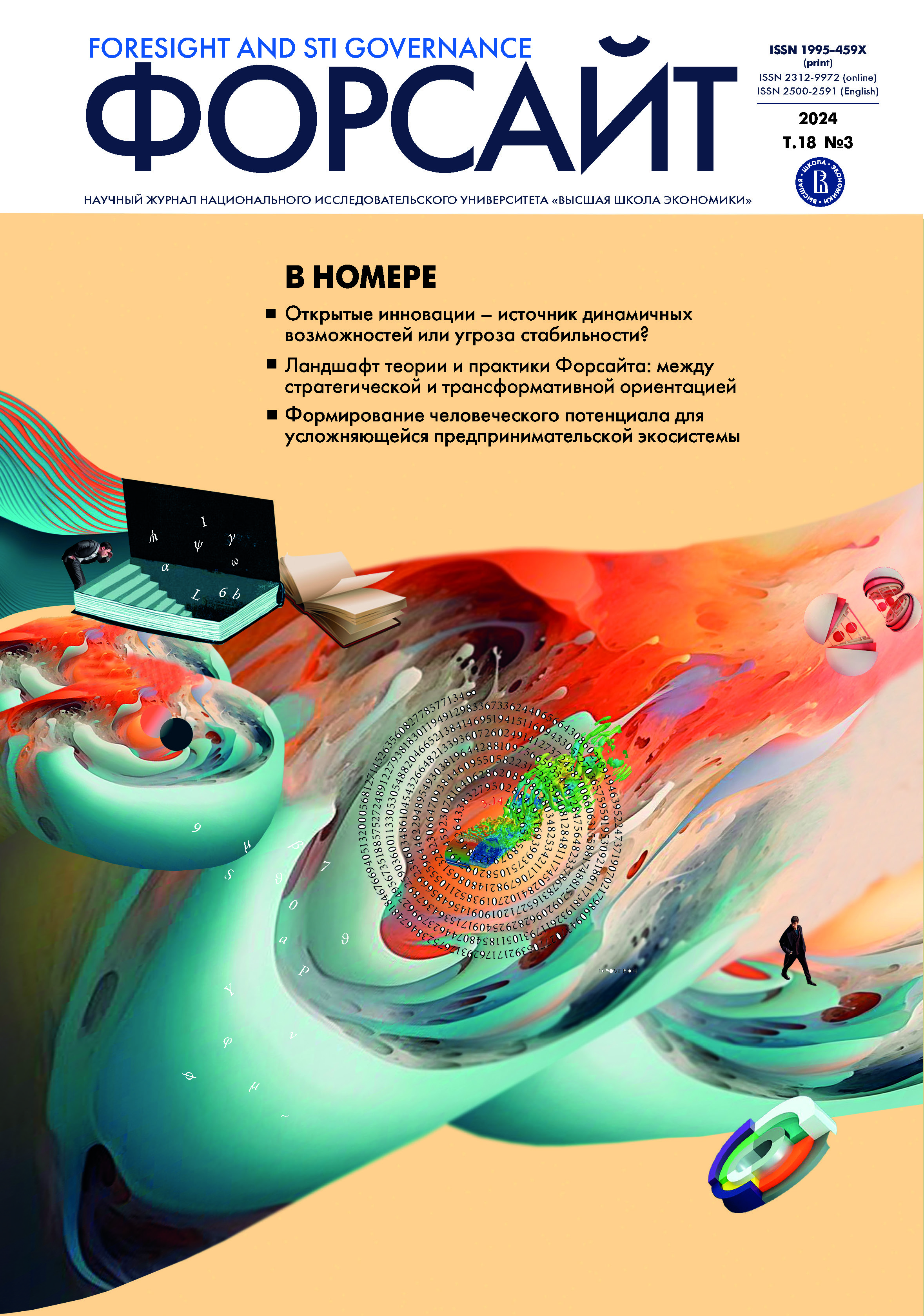Аннотация
Управленческий консалтинг принадлежит к числу самых динамично растущих секторов современной мировой экономики, отличающихся высокой устойчивостью к колебаниям макроэкономической конъюнктуры. Тем не менее исследователи отмечают подрывные тенденции в глобальном консалтинговом бизнесе, связанные с распространением цифровых технологий, в особенности аналитики больших данных и искусственного интеллекта, и прогнозируют их разрушительные последствия для традиционных лидеров индустрии. В попытке разобраться с обоснованностью подобных оценок автор статьи последовательно анализирует специфику отраслевого ландшафта управленческого консалтинга и его эволюцию, исследует ключевые факторы подрывных изменений, которые несет для индустрии углубление цифровизации, и рассматривает основные механизмы, применяемые глобальными лидерами отрасли для адаптации к стремительно развивающейся среде. Показано, что, несмотря на вызовы цифровой трансформации, ведущие игроки мирового рынка консалтинговых услуг не только продолжают динамичный рост, сохраняя конкурентные позиции, но и ведут активную экспансию в новые рыночные сегменты, порождаемые цифровыми сдвигами.
Литература
Beck M., Libert B. (2018) Management Consulting's AI-powered Existential Crisis. MIT Sloan Management Review, September 14. https://sloanreview.mit.edu/article/management-consultings-ai-powered-existential-crisis/, дата обращения 12.05.2024.
Birkinshaw J., Lancefield D. (2023) How Professional Services Firms Dodged Disruption. MIT Sloan Management Review, June 13. https://sloanreview.mit.edu/article/how-professional-services-firms-dodged-disruption/, дата обращения 17.05.2024.
Business Research Insights (2024) Artificial Intelligence (AI) Consulting Market Size, Share, Growth, and Industry Analysis, By Type (IT services and technology, Customer service, Supply chain, Marketing and sales, Finance & Human Resources, & Others), By Application (Telecommunication, Media & Technology, BFSI, Healthcare, Retail, Manufacturing, Government, & Others), Regional Insights, and Forecast to 2032, Pune (India): Business Research Insights.
Cerruti C., Tavoletti E., Grieco C. (2019) Management Consulting: A Review of Fifty Years of Scholarly Research. Management Research Review, 42 (8), 902-925. DOI: https://doi.org/10.1108/MRR-03-2018-0100
Christensen C.M. (1997) The Innovator's Dilemma: When New Technologies Cause Great Firms to Fail, Boston, MA: Harvard Business School Press.
Christensen C.M., Bower J.L. (1996) Customer Power, Strategic Investment, and the Failure of the Leading Firms. Strategic Management Journal, 17(3), 197-218. :3%3C197::AID-SMJ804%3E3.0.CO;2-U. DOI: https://doi.org/10.1002/(SICI)1097-0266(199603)17
Christensen C.M., McDonald R., Altman E.J., Palmer J.E. (2018) Disruptive Innovation: An Intellectual History and Directions for Future Research. Journal of Management Studies, 55, 1043-1078. DOI: https://doi.org/10.1111/joms.12349
Christensen C.M., Wang D., van Bever D.C.M. (2013) Consulting on the Cusp of Disruption. Harvard Business Review, 91(10), 106-115.
Curuksu J. D. (2018) Data Driven: An Introduction to Management Consulting in the 21st Century, Cham, Springer International Publishing AG.
Danneels E. (2011) Trying to Become a Different Type of Company: Dynamic Capability at Smith Corona. Strategic Management Journal, 32(1), 1-31. DOI: https://doi.org/10.1002/smj.863
Davison M.L. (2009) The challenges we face managing those external (and internal) consultants! (Paper presented at PMI® Global Congress 2009-North America, Orlando, FL), Newtown Square, PA: Project Management Institute.
Ellström D., Holtström J., Berg E., Josefsson C. (2022) Dynamic Capabilities for Digital Transformation. Journal of Strategy and Management, 15(2), 272-286. DOI: https://doi.org/10.1108/JSMA-04-2021-0089
Everest Group (2021) Reaching New Frontiers in Experience-centricity and Resilience: Software Product Engineering Services, Hyderabad: Everest Group.
Forrester (2015) Asset-Based Consulting Will Gradually Change the Consulting Revenue Model, Cambridge, MA: Forrester Research, Inc.
Fuller J.B., Raman M., Palano J., Bailey A., Vaduganathan N., Kaufman E., Laverdière B., Lovett S. (2020) Building the On-Demand Workforce, Cambridge, MA: Harvard Business School Press.
Gans J. (2016) The Disruption Dilemma. Cambridge, MA: MIT Press.
Gartner (2020) Market Trends: Asset-Based Managed Services, Stamford, CT: Gartner, Inc.
Gartner (2022) Market Share Analysis: Consulting Services, Worldwide, 2022, Stamford, CT: Gartner, Inc.
Kharlov L. (2020) Modelling the Disruptive Innovation. Review of Business and Economic Studies, 8(3), 29-33. DOI: https://doi.org/10.26794/2308-944X-2020-8-2-29-33
King A., Baatartogtokh B. (2015) How Useful Is the Theory of Disruptive Innovation? MIT Sloan Management Review, 57(1), 77-90.
Klos C., Spieth P., Clauss T., Klusmann C. (2023) Digital Transformation of Incumbent Firms: A Business Model Innovation Perspective. IEEE Transactions on Engineering Management, 70(6), 2017-2033. DOI: https://doi.org/10.1109/TEM.2021.3075502
Larsson A., Andersson N., Markowski P., Nilsson M., Mayor I. (2019) Consulting in the Digital Era? The Role of Tomorrow's Management Consultants. In: The Digital Transformation of Labor (eds. A. Larsson, R. Teigland), London: Routledge, pp. 254-279.
Magistretti S., Pham C.T.A., Dell'Era C. (2021) Enlightening the Dynamic Capabilities of Design Thinking in Fostering Digital Transformation. Industrial Marketing Management, 97, 59-70. DOI: https://doi.org/10.1016/j.indmarman.2021.06.014
McKendrick D.G., Doner R.F., Haggard S. (2000) From Silicon Valey to Singapore: Location and Competitive Advantage in the Hard Disc Drive Industry, Stanford: Stanford University Press.
Miles I. (2020) A Disrupted Future? Foresight and STI Governance, 14(1), 6-27. DOI: https://doi.org/10.17323/2500-2597.2020.1.6.27
Milovidov V. (2018) Hearing the Sound of the Wave: What Impedes One's Ability to Foresee Innovations? Foresight and STI Governance, 12(1), 76-85. DOI: https://doi.org/10.17323/2500-2597.2018.1.76.85
MIT (2023) Generative AI: Differentiating Disruptors from Disrupted. Cambridge, MA: MIT Technology Review Insights.
Nissen V. (2018) Digital Transformation of the Consulting Industry: Extending the Traditional Delivery Model, Cham: Springer.
Schneider M.H.G., Kanbach D.K., Kraus S., Dabic M. (2023) Transform Me If You Can: Leveraging Dynamic Capabilities to Manage Digital Transformation. IEEE Transactions on Engineering Management, 71, 9094-9108. DOI: https://doi.org/10.1109/TEM.2023.3319406
Si S., Chen H. (2020) A Literature Review of Disruptive Innovation: What It Is, How It Works and Where It Goes. Journal of Engineering and Technology Management, 56, 101568. DOI: https://doi.org/10.1016/j.jengtecman.2020.101568
Stahl B., Häckel B., Leuthe D., Ritter C. (2023) Data or Business First? - Manufacturers' Transformation Toward Data-driven Business Models. Schmalenbach Journal of Business Research, 75(6), 303-343. DOI: https://doi.org/10.1007/s41471-023-00154-2
Tavoletti E., Kazemargi N., Cerruti C., Grieco C., Appolloni A. (2022) Business Model Innovation and Digital Transformation in Global Management Consulting Firms. European Journal of Innovation Management, 25(6), 612-636. DOI: https://doi.org/10.1108/EJIM-11-2020-0443
Teece D.J. (2018) Business Models and Dynamic Capabilities. Long Range Planning, 51(1), 40-49. DOI: https://doi.org/10.1016/j.lrp.2017.06.007
UN (1993) Management Consulting: A Survey of the Industry and Its Largest Firms, New York: United Nations.
Verified Market Research (2024) Global Freelance Platforms Market Size By Type of Freelance Platform, By Mode of Operation, By Pricing Model, By Geographic Scope And Forecast, Washington, D.C.: Verified Market Research.
Werner V., Flaig A., Magnusson T., Ottosson M. (2022) Using Dynamic Capabilities to Shape Markets for Alternative Technologies: A Comparative Case Study of Automotive Incumbents. Environmental Innovation and Societal Transitions, 42 (1), 12-26. DOI: https://doi.org/10.1016/j.eist.2021.10.031

Это произведение доступно по лицензии Creative Commons «Attribution» («Атрибуция») 4.0 Всемирная.


